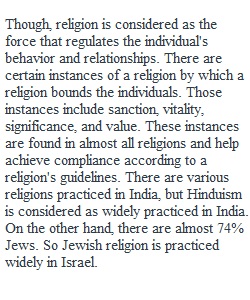


Q Religion can be defined as the means of satisfying certain basic human needs through relationships with dimensions of reality that some find outside of the "natural" realm or within themselves (we will see this in the Lesson on Buddhism). Such basic human needs include the need for: • Sanction = approval or affirmation • Vitality = health or life power • Significance = truth • Value = what is absolutely valuable, pleasurable, or good On the basis of what you have learned in this lesson, discuss how humans can enter into a relationship with this reality in both Indian and Israelite thought, and how these examples of larger realities serve to satisfy the basic human needs listed above. Note any similarities and differences between the two. Keep these ideas in mind as we move through the course and the supernatural realities of Indian and Israelite religions are replaced with other, sometimes less supernatural concerns.
View Related Questions